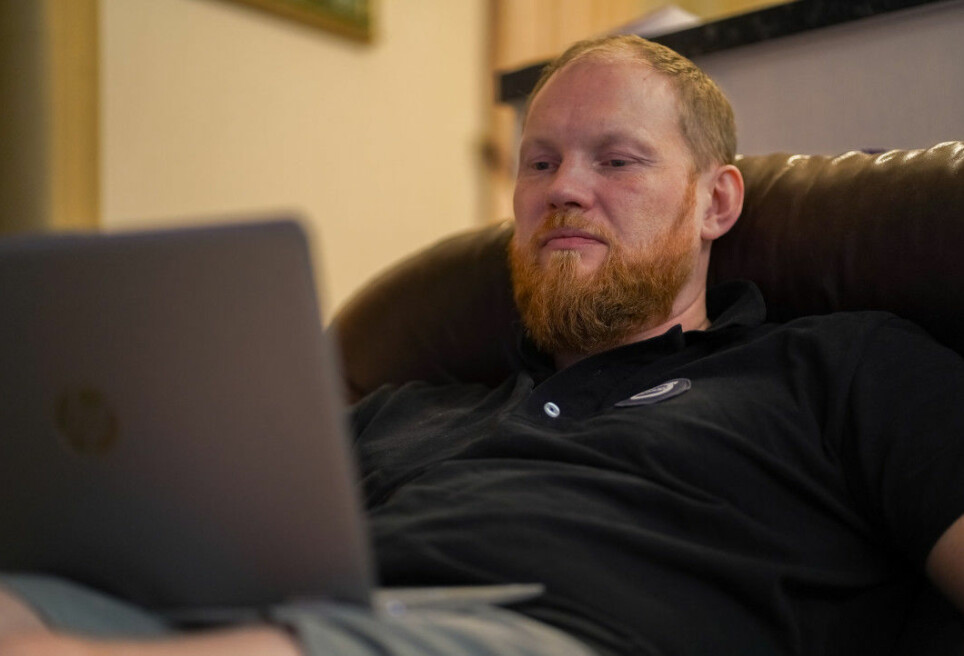
Cyberbullies feel they’re victims of unfair censorship
It’s mostly men who participate in the inflammatory online debates and call themselves provocative, says a new report.
A recent survey shows that very few people participate in inflammatory debates, and even fewer engage in online hate speech. Several of those who do are convinced that they are working for a better world, according to the new report from the Norwegian Institute for Social Research.
About five per cent of the population report that they regularly participate in online debates with a provocative tone.
And only one to two percent say they engage in cyberbullying, in the form of inflammatory, racist or hate speech, according to the report.
“People who participate this online culture have different characteristics than the general population,” said Marjan Nadim. She is one of the researchers behind the new report who was presented their findings at a recent seminar on online debates.

Who are they?
Nadim and her colleagues found some commonalities for individuals who engage in heated online discourse.
It is mostly men who take part in the heated debates and who say that they are provocative.
The latter group also includes some individuals with less education and people who have conservative attitudes towards immigration and homosexuality.
Why do they do it?
According to Nadim, there are many other online debate groups as well, and she believes this challenges the simplistic image that many people have. She believes the survey can help us understand them better.
In addition to the large survey, the researchers conducted nine interviews, in which the participants shared some of what motivates them.
The researchers point to four categories of participants:
1. Those who have a political and ideological agenda
“Here there are clear fronts, it’s us against them,” Nadim says.
“And of course it varies among our informants who is ‘us’ and who is ‘them.’”
These people often have a strong experience of feeling threatened and a perception that people have to wake up and face the truth.
2. Those who just want to inform
These are people who say they simply want to convey pure fact-based knowledge.
“They like to view the debate as very factual and nice,” says Nadim.
“Their statements can be both completely calm and factual in tone, but still express potentially hateful content,” she says.
3. Those who want to be a counter-voice
Many of the debaters believe that they’re standing up for others who don’t dare to express their own opinions. They believe they are a voice for the quiet public.
“A perception among this group is that some people don’t dare to speak up because the price to say what they think is too high,” Nadim says.
“They see themselves as someone who actually dares to be honest and has little to lose.”
4. Those who see it as entertainment and pastime
Some people make comments simply because they find it good entertainment and a fun pastime.
“Most of our informants aren’t employed, or they work full- or part-time by producing content for various websites,” says Nadim.
“They have the time and the opportunity to debate online, and they see it as a source of meaning and commitment,” she explains.
What do they believe in?
Several of the debate participants who make hateful statements are convinced that they are working for a better world, Nadim says.
They are also often frustrated by the tone of the discourse.
Ideologically, they represent a wide range of viewpoints:
Some are fighting against fascism and racism, whereas others are on the far right and fighting a battle against homosexuality and immigrants.
Some debaters also present themselves as completely apolitical.
"In war, anything goes"
Several of the people Nadim spoke to thought it was right and necessary to lob hard shots in online discourse, in order to wake people up.
“Those people who understand the dialogue as war are often more politically and ideologically motivated. And then the debate becomes a war in an extension of the daily war they’re in outside in society,” Nadim says.
“The element of struggle is embedded in the logic of the discourse. You argue against fellow debaters, and the goal is to win.”
These debaters view incitement as a method of sharpening their message so that it gets through.
Fighting against racism and fascism
One debater the researchers spoke with described himself as an anti-fascist.
“For him, racism and fascism are the enemy, and he takes explicit war metaphors to the extreme. And he sees his debate activity as part of that fight,” says Nadim.
He has two goals. One is that people need to be informed and wake up to the threat posed by fascism and racism. The second is that the opponent has to be attacked.
“According to him, it’s completely legitimate to attack the opponent. It’s ‘either them or us,’” says Nadim.
And, she points out, “that’s very literal.”
The researchers find exactly the same logic used among the group on the anti-immigrant side, where immigration and Islam are the perceived threat.
“The debaters’ experience is that something very important is at stake, and so that legitimizes harsh measures,” says Nadim.
Difference between provocative utterances and provocative content
There are differences in online hate speech.
“It can be useful to distinguish between rough language and borderline content,” says Nadim.
They involve the tone versus the content.
For example, there are utterances that are inflammatory in tone, when debaters use insults or stigmatizing words, and where the wording itself crosses boundaries.
And there can be utterances that may be completely calm and factual in tone, but that express potentially hateful content.
One of the debaters interviewed presented himself as an expert on Norwegian history. He maintains that the Sami do not deserve indigenous status or the rights they have.
He debates in a completely different way than the anti-fascist.
“He writes in an almost subdued and factual manner, almost like a professional historian, and he presents a lot of information that can appear to be truthful and correct information.”
“He promotes a rather conspiratorial view of Norwegian history that is probably perceived as transgressing a boundary for a lot of people,” says Nadim.
Some of their own medicine
Nadim explains that individuals who engage in online hate speech do not see themselves as Internet trolls or cyber warriors.
On the contrary, many say they are victims of incitement themselves. Many of them defend their behaviour by saying that they’re just responding to counter-debaters with some of their own medicine.
When debaters have to defend their own debate style, they often shift the responsibility over to the other side and to the debate culture itself.
Many of them believe they are just defending themselves against attack.
“Then they pass the blame for the discourse climate on to people with opposing opinions,” Nadim says.
She says that the survey respondents are willing to admit that they have sunk low and that they’re not particularly proud of it. They are operating at a lower level than where they want to be, but defend it by saying that their opponents started the attack and that they’re just adjusting accordingly.
“An important finding from the study is that inflammatory speech doesn’t always involve an active attacker and a passive recipient. People who say that they participate in dialogue with a provocative tone have often been senders of inflammatory dialogue. But they’ve also often been exposed to hate speech from others,” says Nadim.
“This indicates that hate speech is often part of the dynamic of heated online debates,” she says.
Feel unfairly censored
Many of the boundary-crossing online debaters believe that limits should exist regarding when a statement warrants removal.
They therefore agree that a certain degree of content moderation is necessary.
“They can admit that they cross boundaries themselves, and they may regret their own statements,” Nadim says.
But they have very different perceptions of how such moderating works. Some people think too much is deleted, and others think too little is.
“Everyone thinks that the moderations are unfair and skewed,” says Nadim.
“A lot of debaters call for clearer reasons and explanations for why specific content is deleted.”
But they still want some limits to be in place.
Online debaters who spoke to researchers
The new report on inflammatory discourse and hate speech are supported by an analysis of the larger survey in addition to nine interviews with active online debaters.
The researchers primarily analysed open online discourse, which they believe are in the grey zone. Debates that take place in closed forums among the most extreme groups are not included in the survey.
The researchers note in the report that it’s important to point out that there are a number of challenges when using surveys, especially when the topic is so sensitive.
For example, when they ask respondents if they participate in debates, people will disagree about what an inflammatory debate actually is.
Different people also have different perceptions of what is provocative. A lot of people may also have difficulty admitting that this is what they are doing.
“The nine informants we interviewed are a selected group that actually wanted to talk to us,” Nadim says.
“They are in no way representative of everyone who’s involved in cyberbullying in Norway,” she says.
Important to understand debaters
Nadim and the other researchers believe it is important to understand the people behind cyberbullying.
“You don’t get anywhere by simply labelling people online haters or net trolls,” she says.
“And understanding isn’t the same as defending. It’s trying to understand the other's perspective and what underlies it and how they see themselves. It’s a first and necessary step to be able to meet someone halfway and create room for change.”
“This doesn’t mean that we should accept their behaviour or message, but it helps us understand why they behave as they do,” says Nadim.
Several of the debaters the researchers spoke to showed an openness to self-reflection, she said. They admitted that some of the discourse is messy.
“The interviewees expressed the same type of debate ideals as anyone else, and that’s exactly where we have an opportunity to be able to engage in dialogue,” says Nadim.
"A lot of research on preventing radicalization and extremism suggests that understanding is the way to go if you want to change someone's behaviour," says Nadim.
“You have to meet people halfway.”
———































